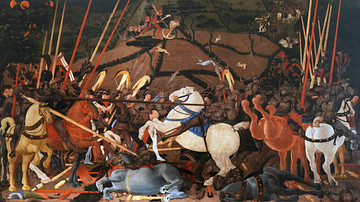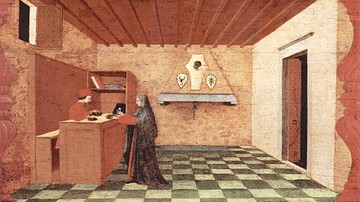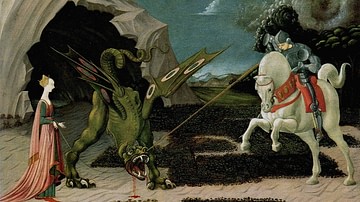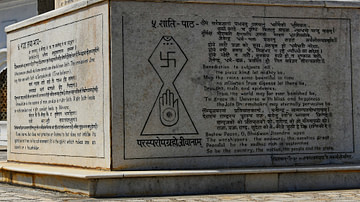Search Images
Browse Content (p. 819)

Image
The Florentine Academy by Baccio Bandinelli
The Florentine Academy by the Italian Renaissance artist Baccio Bandinelli.

Image
Self-portrait by Baccio Bandinelli
A self-portrait by the Italian Renaissance artist Baccio Bandinelli. c, 1530 CE. (Isabella Stewart Gardner Museum, Boston)

Image
Renaissance Sculptor's Workshop Relief
A detail of a relief showing the interior of a Renaissance sculptor's workshop by Nanni di Banco. c. 1416 CE. (Or San Michele, Florence)

Image
Sculptor's Workshop by Nanni di Banco
A detail of a relief showing a Renaissance sculptor's workshop by Nanni di Banco. c. 1416 CE. (Or San Michele, Florence)

Image
The Hunt by Uccello
The Hunt painting by the Italian Renaissance artist Paolo Uccello (1397-1475 CE). Painted c. 1460-1470 CE. (Ashmolean Museum, Oxford, England)

Image
Battle of San Romano by Uccello
A painted panel, one of three which together make up the Battle of San Romano by the Italian Renaissance artist Paolo Uccello (1397-1475 CE). This panel, the second in the series, is an example of Uccello's concern with perspective painting...

Image
Miracle of the Desecrated Host by Uccello
A painted panel, one of six which together make up the Miracle of the Desecrated Host by the Italian Renaissance artist Paolo Uccello (1397-1475 CE). This panel, the first in the series, is a triumph of Renaissance perspective painting...

Image
St. George & the Dragon by Uccello
Saint George & the Dragon, painting by the Italian Renaissance artist Paolo Uccello (1397-1475), created c. 1470.
National Gallery, London.

Image
Jain Symbol
The Jain symbol at Sonagiri, Madhya Pradesh. Sonagiri has scores of Jain temples dating from the 9th century CE onwards. There are a total of 103 temples with 77 on hill and 26 in the village. The place is considered sacred by devotees. Sonagiri...

Image
Descartes' House
Maison Descartes, the house where the philosopher René Descartes (1596-1650) lived in the Netherlands.
De Weteringschans, Amsterdam.